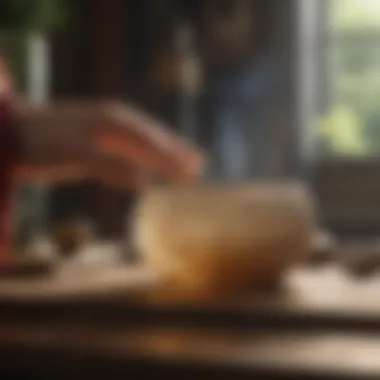Learn Reiki for Free: Unlocking Energy Healing Opportunities


Intro
Reiki is a spiritual practice that offers many people relief from stress and promotes healing. Yet, learning Reiki often comes with fees that can be a barrier for those eager to explore its teachings. This article provides guidance for those wanting to learn Reiki without incurring financial costs.
Opportunities for free learning exist. They range from online resources to community workshops. Understanding the principles of Reiki, its benefits, and how to ethically practice it is crucial. Not only will readers find practical ways to access holistic education, but they will also gain insight into maintaining integrity in their practice.
As we dive deeper into the resources available, it will become clear how individuals can embark on this enlightening journey. We will cover numerous platforms and materials to aid your quest for knowledge, ensuring that anyone can embrace Reiki, regardless of their financial situation.
Online Resources for Free Reiki Learning
The internet has become a vast trove of information. Several websites and platforms offer free Reiki courses, lessons, and videos. Here are some notable options:
- YouTube: Many practitioners share free sessions explaining Reiki techniques. Channels dedicated to holistic healing often post instructional videos.
- Websites: Some practitioners provide free online courses through their websites, where you can learn at your own pace.
- Reddit: The Reiki subreddit is a helpful place to ask questions, find resources, and connect with others learning Reiki.
These platforms help beginners understand the core concepts of Reiki, which is energy healing used for relaxation, balance, and well-being.
Community Workshops and Local Meetups
One of the best ways to learn Reiki without a fee is through local groups. Many practitioners host free workshops or community meetups. Here is how to find them:
- Local Holistic Centers: Check bulletin boards in holistic centers or yoga studios. They often host free events or workshops.
- Facebook Groups: Many areas have groups focused on healing practices. Joining such groups can lead to discovering free sessions.
- Meetup.com: A platform for finding local events, it could lead you to free Reiki gatherings.
Participating in these workshops allows for interaction with practitioners and fellow learners.
Self-Study Materials
Books, articles, and other forms of media provide an excellent way to guide your Reiki education. Consider:
- E-books and PDFs: Numerous practitioners offer free downloadable resources.
- Podcasts: Look for podcasts focusing on Reiki and healing. They often provide insights from experienced practitioners.
- Online Articles: Websites like Wikipedia and Britannica have informative articles that explain Reiki principles and history. These can ground your understanding before diving deeper.
Self-study allows learners to digest materials at their own pace and revisit concepts as needed.
Ethical Considerations in Reiki Practice
As you embark on this journey of learning, it is essential to maintain ethical aspects of practice. Reiki is rooted in respect, compassion, and integrity. Here are some points to consider:
- Respect for Energy: Understand the significance of intent when working with energy. Avoid practicing without awareness of its effects on yourself and others.
- Privacy and Boundaries: Always respect the personal space and boundaries of those you work with. Confidentiality is vital.
- Ongoing Learning: Commit to continuous development. Even as you learn freely, strive for knowledge and experience to build your practice responsibly.
Prelude to Reiki
Reiki represents a profound dimension of alternative healing, widely acknowledged for its potential in promoting emotional, mental, and physical well-being. This section sets the stage for understanding Reiki's foundational importance within the broader context of accessible learning opportunities. It is essential to comprehend the historical and philosophical roots of Reiki to enter this healing practice from an informed perspective.
The Origins of Reiki
Reiki emerged in the early 20th century in Japan, developed by Mikao Usui. His journey began after intense meditation and reflection led to his discovery of universal life energy, a force prevailing in all living beings. This pivotal moment became the cornerstone of Reiki practice, emphasizing both healing and spiritual growth. Usui's teachings encompass the traditional hand positions and symbols used in Reiki today.
The essence of Reiki lies in its simplicity. Practitioners channel energy through their hands, facilitating a calming effect on the recipient. It is essential to understand that Reiki is not a medical treatment. Instead, it complements traditional healthcare. The historical context instills a deeper appreciation for this practice, revealing its evolution and the synthesis of ancient philosophies with modern interpretations.
Understanding the Energy Healing Concept
At its core, energy healing hinges on the belief that every living being possesses an energy field, often referred to as life energy or chi. This life energy flows through and around us, influencing emotional, mental, and physical states. When sufficient energy is present, individuals can experience harmony. Conversely, blockages or insufficient energy may lead to distress or illness.
Reiki acts to restore this balance. Practitioners often describe the sensations experienced during sessions as warming, soothing, and enveloping. Clients may report feelings lasting long after a session, promoting a sense of connectivity and peace. It is essential for learners of Reiki to grasp this foundational energy concept as it significantly enhances their understanding of energy dynamics in healing.


Reiki is about transmission, trust, and balance. By learning its principles, individuals can embark on a transformative journey, enhancing both their lives and the lives of others.
In summary, laying a robust groundwork by exploring the origins of Reiki and the energy healing concept will prepare aspiring practitioners for the journey ahead. Understanding these elements is crucial for anyone considering learning Reiki, particularly when seeking varied tools to foster personal and communal well-being.
Benefits of Learning Reiki
Learning Reiki offers many benefits, both for the individual and for those around them. Understanding these advantages is crucial as it highlights the importance of Reiki in personal and professional life. As a practice centered on energy healing, Reiki can enhance well-being, foster empathy, and open doors to various career opportunities in the field of holistic healing.
Enhancing Personal Well-being
Reiki can serve as a powerful tool for personal development. Many practitioners report that it helps in reducing stress and anxiety. The practice encourages relaxation, which is vital for mental health. Individuals often find that during Reiki sessions, their minds quiet down, allowing for a deeper connection with their inner self.
Another essential aspect is the fostering of self-awareness. By learning Reiki, one becomes more attuned to their emotional and physical states. This enhanced awareness enables better decision-making and more conscious living. Moreover, many practitioners note improved sleeping habits, which play a significant role in overall health.
Reiki does not just impact mental well-being; it also has physical benefits. People undergoing Reiki treatments often experience relief from chronic pain and faster recovery from physical ailments. Thus, it serves as a complementary therapy in conjunction with traditional medical treatments.
Developing Empathy and Connection
One of the most profound benefits of learning Reiki is the development of empathy. Practicing Reiki requires an open heart and mind, which promotes a deeper understanding of others' feelings and emotional states. This can lead to enriched relationships, fostering connections that are more supportive and nurturing.
Empathy enhances interactions with family, friends, and clients. When a person becomes more aware of the energy in their environment, they can relate better to others’ experiences. This connection is essential in healing practices, as it allows the Reiki practitioner to intuitively grasp what others might need.
Additionally, learning Reiki cultivates a sense of community. Engaging with fellow practitioners creates bonds that can provide support and guidance. These shared experiences help in personal growth and create a network for exchanging knowledge, ultimately enriching the practice.
Professional Opportunities in Energy Healing
The field of energy healing is growing, and learning Reiki opens up numerous professional avenues. Many people find fulfilling careers as Reiki practitioners or integrate Reiki into their existing practices, such as in massage therapy, counseling, or holistic health coaching.
Certifications and workshops are frequently available at different levels, enhancing qualifications for those looking to establish credibility and attract clients. Additionally, as awareness about alternative healing practices increases, so does the demand for trained practitioners.
Moreover, many companies and wellness centers are beginning to recognize the value of Reiki and its role in employee well-being programs. This recognition presents new opportunities for Reiki practitioners to work in corporate settings, providing stress relief and wellness programs.
Free Resources for Learning Reiki
Learning Reiki can provide significant advantages, especially when discovered through free resources. The importance of this topic in the article cannot be overstated. For many, the financial burden of alternative healing education is a barrier. By focusing on free avenues, individuals can access valuable practices that promote well-being, empathy, and connection without monetary constraints. Moreover, empowerment through self-education fosters a deeper understanding of Reiki principles and the ethical implications of practice.
Online Platforms Offering Free Courses
The digital world is replete with online platforms that offer free Reiki courses. Websites like Coursera, Udemy, and even specific holistic practice sites can provide introductory lessons that are essential for novices. These platforms often include:
- Video tutorials that explain essential techniques.
- User forums for interaction with peers and instructors.
- Course materials that you can access anytime.
Among these, platforms like Coursera may host classes from accredited institutions that cover basic concepts, attunements, and hands-on practices.
Webinars and Online Workshops
Webinars and online workshops are becoming increasingly popular for learning Reiki interactively. Many practitioners host these sessions at no cost to introduce their methods and philosophies. Participating in a webinar often includes:
- Live demonstrations of techniques.
- Q&A sessions allowing direct engagement with instructors.
- Networking opportunities with other participants who share similar interests.
These informal learning opportunities can significantly enrich one's understanding, providing real-time feedback and fostering community connections.
Free E-books and Guides


E-books and guides are another excellent free resource for those learning Reiki. Various authors and practitioners share their knowledge through downloadable materials that cover different aspects of Reiki. These resources typically include:
- Step-by-step instructions for practice.
- Historical context surrounding Reiki techniques.
- Case studies demonstrating the effectiveness of Reiki healing.
Many websites offer free e-books or downloadable PDFs which can be found through simple online searches. Websites like Project Gutenberg hold a collection of books related to holistic practices, making them valuable resources for self-learners.
Community Resources and Local Groups
Understanding community resources and local groups is crucial for anyone aiming to learn Reiki without financial investment. These resources offer access to a network of practitioners, workshops, and shared experiences. Engaging with local groups not only facilitates skills development but also aids in building connections that enhance one's learning journey. The interpersonal aspect of learning can amplify the understanding of Reiki, providing real-time feedback and emotional support.
Finding Local Reiki Practitioners
Discovering local Reiki practitioners is essential. They often provide guidance and mentorship that can be invaluable for a beginner. To locate these practitioners, consider options such as searching through local directories, visiting wellness centers, or checking community bulletin boards. Many practitioners are open to sharing their knowledge and might even offer free initial consultations. However, when reaching out, ensure you approach them politely, expressing specific interest in learning rather than merely seeking a service.
Benefits of Connecting with Practitioners
- Direct access to experienced individuals can enhance your skills.
- Opportunities for personal mentorship that provides tailored feedback.
- The chance to participate in group practices, fostering a sense of community.
Participating in Community Workshops
Community workshops provide a collaborative environment that promotes group learning. These workshops are often organized in local centers, libraries, or spiritual communities, allowing participants to learn from qualified instructors. They may cover basics and advanced techniques in Reiki, enabling you to absorb knowledge from hands-on experiences.
Advantages of Workshops
- Hands-on experiences that cannot be replicated through online learning.
- Personalized attention from instructors who can address specific queries.
- Networking opportunities with like-minded individuals which can lead to lasting relationships.
Engaging in Meetups and Support Groups
Joining meetups and support groups is another way to deepen your understanding of Reiki. These groups often gather regularly to discuss various aspects of Reiki, share personal experiences, and practice techniques together. Engaging in these settings can create a supportive atmosphere where individuals feel encouraged to share and learn from one another.
Benefits of Support Groups
- Offers emotional support and motivation among peers.
- An informal setting that encourages questions and discussions about personal growth.
- Regular practice opportunities that help refine skills over time.
Self-Study Approaches
Self-study approaches are essential in learning Reiki for free. This method allows individuals the flexibility to learn at their own pace, fostering a deeper understanding of the practice. Self-study not only empowers learners to explore resources that resonate with them but also encourages personal reflection and development.
Engaging in self-study requires discipline and commitment. No instructor or structured environment guides the learner, so individuals must take the initiative. This autonomy can lead to profound insights into Reiki, enhancing the overall learning experience.
Key benefits of a self-study approach include:
- Cost-effectiveness: Many online resources and books are free or low-cost.
- Adaptability: Learners can adjust their study schedule to fit their other commitments.
- Personalization: Each learner can focus on areas that interest them the most.
Moreover, self-study offers an opportunity to integrate personal experiences into the learning process. By examining one's own energetic responses, a student can deepen their understanding of Reiki principles.
Utilizing Online Resources for Self-Teaching
A wealth of online resources exists for self-study in Reiki. Websites and platforms, such as YouTube, offer free instructional videos and tutorials. These resources can range from full workshops to short demonstrations of specific techniques. Websites like Wikipedia and Britannica provide an excellent foundation for understanding the background of Reiki.
Additionally, forums on Reddit and Facebook can provide valuable community support. Engaging with others who are also learning Reiki can foster a sense of belonging. Asking questions and sharing experiences enriches the learning process.
Some recommended resources for online self-teaching include:


- YouTube: Search for Reiki tutorials or workshops.
- Online Articles: Find articles on platforms like Wikipedia to understand Reiki's origins.
- Discussion Forums: Participate in discussions on Reddit or relevant Facebook groups.
Integrating Reiki Practices into Daily Life
Incorporating Reiki into daily routines helps solidify learning. Consistent practice makes principles clearer. Simple techniques can include meditative practices and self-healing sessions. These practices help in grasping energy flow and enhancing personal well-being.
Here are some practical ways to integrate Reiki into everyday life:
- Daily Self-Treatment: Spend a few minutes daily working on self-healing.
- Meditation: Use meditation to connect with Reiki energy.
- Mindfulness: Practice mindfulness and grounding techniques throughout the day.
Establishing a dedicated space for practice can also foster a stronger connection to Reiki energy. This designated area can serve as a sanctuary for meditation, reflection, and self-care.
Overall, self-study approaches encourage individuals to be proactive in their learning. By utilizing online resources and integrating practices into daily life, learners can cultivate a deeper understanding of Reiki that remains accessible and enriching.
Ethical Considerations in Reiki Practice
Understanding the ethical considerations in Reiki practice is crucial for anyone who wishes to engage deeply with this healing art. Reiki practitioners must be aware of the responsibilities that come with their practice, especially when they offer healing services to others. Establishing and maintaining a strong ethical foundation ensures a safe environment for both practitioners and clients. This part of the Reiki journey is about prioritizing integrity, respect, and genuine care.
Maintaining Personal Integrity
Personal integrity is a core tenet of effective Reiki practice. Practitioners are encouraged to stay true to their values and beliefs. This internal alignment helps practitioners to create a safe space for their clients. When practitioners act from a place of honesty, it fosters trust. Clients can sense whether a practitioner is authentic or not, which can significantly affect the healing experience.
Practicing with integrity also involves continual self-assessment. Reiki practitioners should regularly reflect on their own motives and methods. Are they healing for the right reasons? Are they treating clients with respect and dignity? Engaging in ongoing personal and professional development is essential. This might involve attending workshops, reading literature on Reiki ethics, or participating in supervision groups with other practitioners.
Respecting Client Boundaries and Needs
Respecting client boundaries and needs is another vital ethical consideration. In Reiki practice, it is essential to create a trusting relationship where clients feel safe and respected. Practitioners should obtain informed consent before any session. This means explaining what Reiki involves, what they can expect, and addressing any questions they may have.
Furthermore, practitioners must be attentive to the unique needs of each client. This includes being mindful of their physical and emotional boundaries. It is essential to avoid making assumptions about what clients need or want from a session. Instead, practitioners should foster open communication to ensure that the clients feel empowered in their healing journey.
Ethics in Reiki practice is not just about rules; it’s about creating a relationship founded on respect, trust, and mutual understanding.
By upholding ethical standards, Reiki practitioners contribute to a holistic healing environment. This consciousness enhances not only the practitioners' professional reputation but also enriches the overall Reiki community. Ensuring that personal integrity is maintained and that client boundaries are respected will ultimately lead to more profound healing experiences for all involved.
Avoiding Common Pitfalls
The journey of learning Reiki is filled with potential but also fraught with challenges. Understanding the common pitfalls is essential for anyone interested in this healing practice. By being aware of these issues, learners can navigate their path more effectively and sustain a long-term commitment to their Reiki journey.
Recognizing Misinformation and Scams
In the digital age, misinformation is widespread. This holds true for Reiki. Many sources claim to offer genuine Reiki education, yet some may misrepresent their qualifications or teaching methods. It is crucial to discern credible from non-credible information.
One key area to watch for is the certification claims. Some individuals might offer courses that promise accreditation without proper recognition. Verify the credentials of instructors. Research their background in Reiki and their experience. Look for reviews and testimonials. Following that, if a deal seems too good to be true, it often is.
In platforms like Facebook or Reddit, you might find discussions about various Reiki workshops. Engage with these communities to hear firsthand experiences from others. This can help in recognizing fraudulent offerings.
Ending
The discussion around learning Reiki for free holds significant relevance, especially for those aiming to integrate holistic practices into their lives. This journey is not merely about acquiring a skill; it is about embracing a philosophy of healing that resonates deeply within us. The insights provided throughout this article highlight the accessibility of Reiki education, which helps demystify a practice often viewed as exclusive or elitist due to its costs.
Understanding the benefits of learning Reiki, such as personal well-being and professional opportunities, underscores why this pursuit is worthwhile. Free resources make it even more attainable. Online platforms, community groups, and self-study approaches are invaluable tools in this learning process. Each method offers different pathways, allowing individuals to choose what suits them best.
Moreover, ethical considerations remain at the forefront of Reiki practice. Navigating through these aspects ensures that learners maintain integrity, thereby fostering trust within their future client interactions.
"The more we understand Reiki, the deeper our connection to its transformative potential."
Recognizing and avoiding common pitfalls also elevates the learning experience. By identifying misinformation and assessing the quality of materials, practitioners can build a strong foundation in their practice.
Ultimately, the pursuit of Reiki education is an endless journey. It evolves and unfolds as practitioners delve deeper into the principles and techniques. This ongoing process reflects the dynamic nature of personal growth and healing. As readers contemplate their engagement with Reiki, they should remember that this journey is intertwined with their ongoing quest for understanding and enlightenment.



